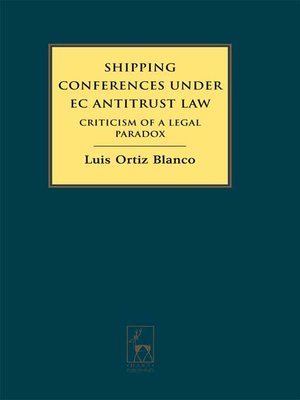Shipping Conferences under EC Antitrust Law
ebook ∣ Criticism of a Legal Paradox
By Luis Ortiz Blanco

Sign up to save your library
With an OverDrive account, you can save your favorite libraries for at-a-glance information about availability. Find out more about OverDrive accounts.
Find this title in Libby, the library reading app by OverDrive.



Search for a digital library with this title
Title found at these libraries:
| Library Name | Distance |
|---|---|
| Loading... |
Liner conferences are among the oldest surviving cartels in the world. Created in the 1870s they have existed since on all the world's shipping routes. With the approval or tacit acquiescence of governments everywhere, they fix freight rates, control capacity and share markets. The United Nations Code of Conduct for Liner Conferences (1974) granted them global recognition and prompted the European Community to recommend Member States to join the Convention on the Liner Code (1979) and to grant them the most generous and extraordinary block exemption from EC antitrust rules ever (1986). The European Commission's administration of the block exemption has clarified some of its aspects and, to a certain extent, limited its scope; but until very recently, it has not questioned the appropriateness of the exceptionally lenient treatment of liner shipping cartels in the European Union. After a report by the OECD Secretariat (2002) recommending abolition of antitrust immunity for shipping cartels in member countries, the European Commission launched a review of the block exemption (2003) which has led to its repeal (2006).
This book studies first the origins, the early history and the regulation of liner conferences in the world and in the European Community, focusing in particular on the Regulation which granted a block exemption to liner conferences. Then, it examines one by one the four conditions for a block exemption to be granted under EC law, and concludes that none of them is fulfilled by shipping cartels. Finally, it proposes some alternative scenarios and solutions for the adequate enforcement of antitrust law in the maritime sector once the block exemption has been repealed.







